
Common Causes Of Sore Throat
A sore throat is an irritation or pain in the throat. Inflammation or tumors of the throat cause irritation. The most common cause of throat inflammation is infection. Ninety percent of infections are viral. Bacteria account for the rest. Fungal infections of the throat are usually seen in patients with a poor immune system. Severe chronic illnesses, long term steroid therapy and AIDS/HIV patients lead to poor immune systems. Stomach acids come back up to the throat in the case of gastro-esophageal reflux disease. These potent acids readily damage the throat. Regurgitated stomach acids damage not only the throat but also teeth leading to dental caries. Abnormal growths in throat (malignant tumors) present as sore throat as well. They can also cause a hoarse voice. A chronic hoarse voice with a sore throat may suggest a cancer in the throat. Therefore, get yourself checked out.
- Important notification about information and brand names used in this slideshow!
- Photo courtesy of JF Sebastian by Flickr : www.flickr.com/photos/jf-sebastian/535887527/
- Clinical medicine by Kumar and Clark
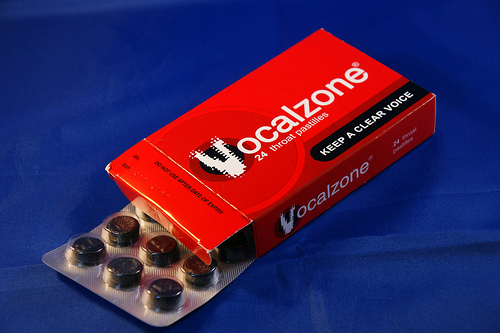
Non-Steroidal Anti-Inflammatory Drugs (NSAID)
Examples: Diclofinac, indomethacin and celecoxib. Non-steroidal anti-inflammatory drugs are pain killers. In some countries, NSAIDs are available over the counter. There is a large range of NSAIDs available. Some are potent and some have only a mild anti-inflammatory action. Although they have different structures, they all inhibit prostaglandin formation. NSAIDs are effective against pain of mild to moderate intensity. Once used, NSAIDs do not cause dependence like opioids. Prostaglandin is a potent chemical released during inflammation, which is responsible for many effects of inflammation. NSAIDs stop prostaglandin and in turn inflammation. NSAIDs also reduce fever and increase the risk of gastritis and gastric ulcers. There are other effects of NSAIDs as well. They prolong childbirth, thin blood and have significant effects on the vessels of the newborn.
- Important notification about information and brand names used in this slideshow!
- Photo courtesy of Tim Ellis by Flickr : www.flickr.com/photos/tim_ellis/5005314286/
- Clinical pharmacology by Bennette and Brown

Gargle With Warm Salt Water Mixed With Remedies
Gargling with salt water is very effective against throat infections. Every living cell lives in equilibrium with its surroundings. Human cells live in the extra cellular fluid. Some bacteria that cause sore throat live in the same extra cellular environment. There is a delicate balance of ions inside and outside cells. Any change in the immediate environment has a profound effects on the cells. Water diffuses from an area of low substance concentration towards an area with high substance concentration. Salt water has a high concentration of sodium chloride. This tends to draw water out from inside cells. Regular gargling with salt water will draw water out of bacteria and dries them out. Water washes off the bacteria as well. This accelerates healing.
- Important notification about information and brand names used in this slideshow!
- Photo courtesy of zpeckler by Flickr : www.flickr.com/photos/zpeckler/2677790543/
- A review of medical physiology by Ganong
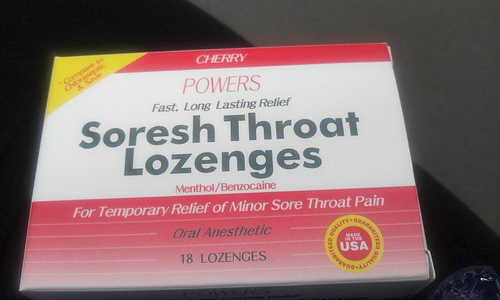
Use Non-Prescription Throat Lozenges
These are cough tablets. There are many brands on the market. Common ingredients of cough drops are benzocaine, eucalyptus oil, dextromethorphan, menthol, honey, pectin, propylene glycol, methyl cellulose and zinc gluconate glycine. Zinc gluconate glycine, pectin, methyl cellulose and propylene glycol form a thin protective mucus layer over the walls of the throat which relieves minor pain, inflammation and irritation. Eucalyptus oil limits infections in the airways. It boosts the immune system by enhancing phagocytosis of germs by macrophages. Additionally, it controls mucus secretion in the airways and may reduce severity of asthma. Eucalyptus oil also relieves pain when applied topically. Benzocaine is an anesthetic. It numbs the sensory nerves of the throat, relieving irritation.
- Important notification about information and brand names used in this slideshow!
- Photo courtesy of Cali4beach by Flickr : www.flickr.com/photos/cali4beach/8636231073/
- Clinical pharmacology by Bennette and Brown
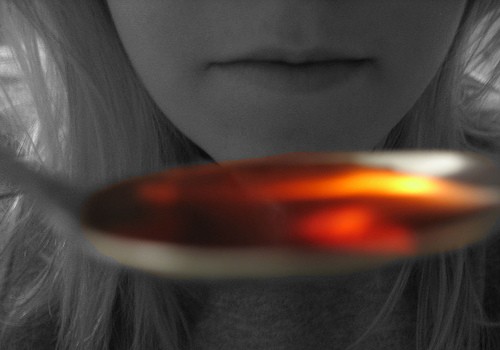
Cough Syrups Can Help Ease Soreness
There are many cough syrups on the market. They are not recommended for children below 6 years of age. Dextromethorphan is a moderately effective cough suppressant which acts directly on the brain to increase the threshold of cough. There is no evidence to support its effective use in children. Codeine was used until recently as an effective cough medicine, but recent studies have shown it to be ineffective. Bromhexine inhibits mucus secretion and stops airway obstruction. Acetylcysteine breaks up phlegm inside the lungs. Guaifenesin increases watery airway secretions. Thus mucus is less viscous and flows out freely. Guaifenesin improves function of airway transport mechanisms and brings out phlegm more readily.
- Important notification about information and brand names used in this slideshow!
- Photo courtesy of socogirl5000 by Flickr : www.flickr.com/photos/socogirl5000/362729756/
- Clinical pharmacology by Bennette and Brown
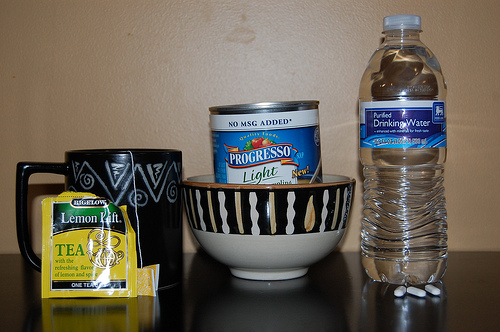
Stay Hydrated
Water is essential for life. Good hydration boosts the metabolism, enhances the immune system and improves defenses against infections. Studies have shown that there is an increased incidence of infections if you have dehydration. Dehydration reduces saliva production. Saliva lubricates the throat. It washes away germs and dilutes regurgitated stomach acids. Lysozymes in saliva have antibacterial action. With adequate hydration there is less chance of an oral or throat infection. The act of drinking water rinses the mouth and throat. Water flushes bacteria into the stomach where they cannot withstand the acidity. Regular water intake reduces the effects of gastro-esophageal reflux by diluting and washing away regurgitated acids.
- Important notification about information and brand names used in this slideshow!
- Photo courtesy of Twanda Baker by Flickr : www.flickr.com/photos/ryteclick/4342460334/
- A review of medical physiology by Gannong
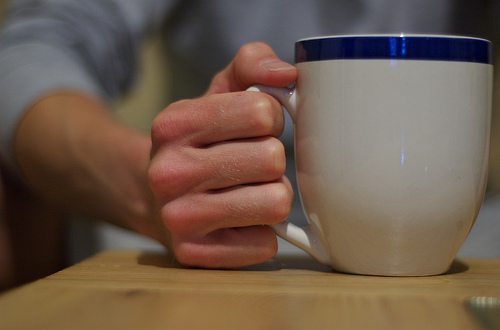
A Warm Cup Of Herbal Tea
Herbal tea has substances that counteract stomach acidity. It accelerates the transport of food from the stomach into the duodenum reducing the risk of reflux (improves gastric emptying). Herbal tea contains substances that form a thin film of protective mucus (demulcents) over the throat to relieve irritation and inflammation. Slippery elm, parsley, oatmeal, marshmallow, mallow, liquorice, lungwart, irish moss, mullein, flaxeed, couch grass, corn silk, purslane, comfrey and coltsfoot are known demulcents. Herbal tea has other important health benefits as well. It contains anti-oxidants which limit plaque formation in blood vessels in the presence of high blood lipid levels. Thus it reduces the risk of heart diseases, stroke and peripheral vascular diseases.
- Important notification about information and brand names used in this slideshow!
- Photo courtesy of samwebster by Flickr : www.flickr.com/photos/samwebster/3904240781/
- Clinical pharmacology by Bennette and Brown
- Healing herbs and spices by Lee Anne Dobbins
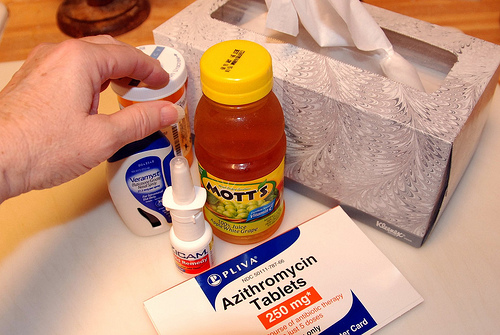
Decongestants Relieve Swelling
Decongestants are used to clear up obstructions of the nasal passages in coryza. Viruses and bacteria produce substances that are not compatible with the body. In response to these chemicals, the lining of the nasal passages and throat swell and secrete mucus. This gives the feeling of fullness. Decongestants relieve obstructions and permit drainage of sinuses. This accelerates healing. Infective agents spread along the tube connecting the throat to the middle ear (Eustachian tube). In adults the Eustachian tube is oblique and drains by gravity. In children it is horizontal and drains more slowly. Therefore, with throat infections children can get middle ear infections as well.
- Important notification about information and brand names used in this slideshow!
- Photo courtesy of Judy Baxter by Flickr : www.flickr.com/photos/judybaxter/2786692595/
- Illustrated textbook of pediatrics by Lissauer and Graham
- Clinical medicine by Kumar and Clark
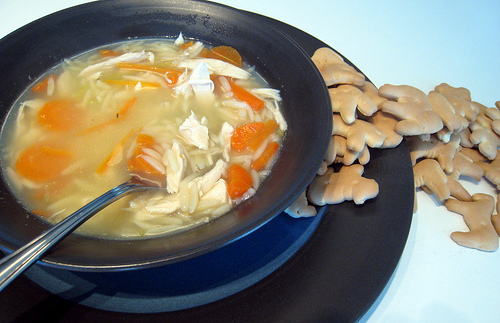
Chicken Soup
Chicken soup is a well-known home remedy for coughs and a sore throat. Experts speculate as to how effective it is. One theory suggests that the high sodium content in chicken soup produces an effect similar to gargling with salt water. The high sodium concentration draws water out of bacteria, drying them out. Chicken soup is also very rich in essential nutrients. When a disease causing organism enters the body, the immune system mounts a resistance. This defense mechanism requires a lot of energy. In established infections, there is extensive tissue damage. Repair of damaged tissue and recovery needs additional energy. Therefore it is always good to take extra calories to cope with increased demand.
- Important notification about information and brand names used in this slideshow!
- Photo courtesy of William Jones by Flickr : www.flickr.com/photos/fritish/3396679714/
- Clinical nutrition by Alan R Gaby

Rest And Take It Easy
Rest improves healing. Serotonin is the feel-good chemical in the brain. Studies have shown that adequate sleep increases the serum concentration of serotonin. Sleep is the time for repair and recovery. During sleep, the body switches into "building" mode. Tissues pay out the oxygen debt of vigorous activity and repair damaged tissues. The stores energy sources deplete during prolonged activity and sleep is the time these stores are replenished. During sleep, the heart-rate slows down and blood pressure normalizes. Cardiac output drops. The liver, kidneys, and brain receive a good blood supply during sleep to ensure detoxification, waste disposal and neural repair.
- Important notification about information and brand names used in this slideshow!
- Photo courtesy of Richard by Flickr : www.flickr.com/photos/rbanks/431324025/
- Clinical medicine by Kumar and Clark



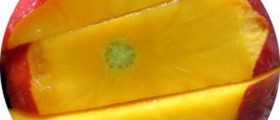


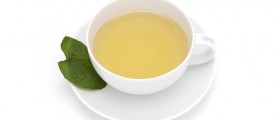
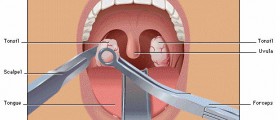




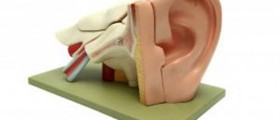


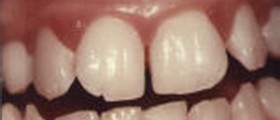
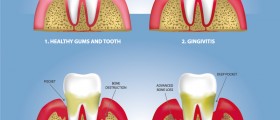



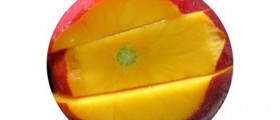






Your thoughts on this
Loading...